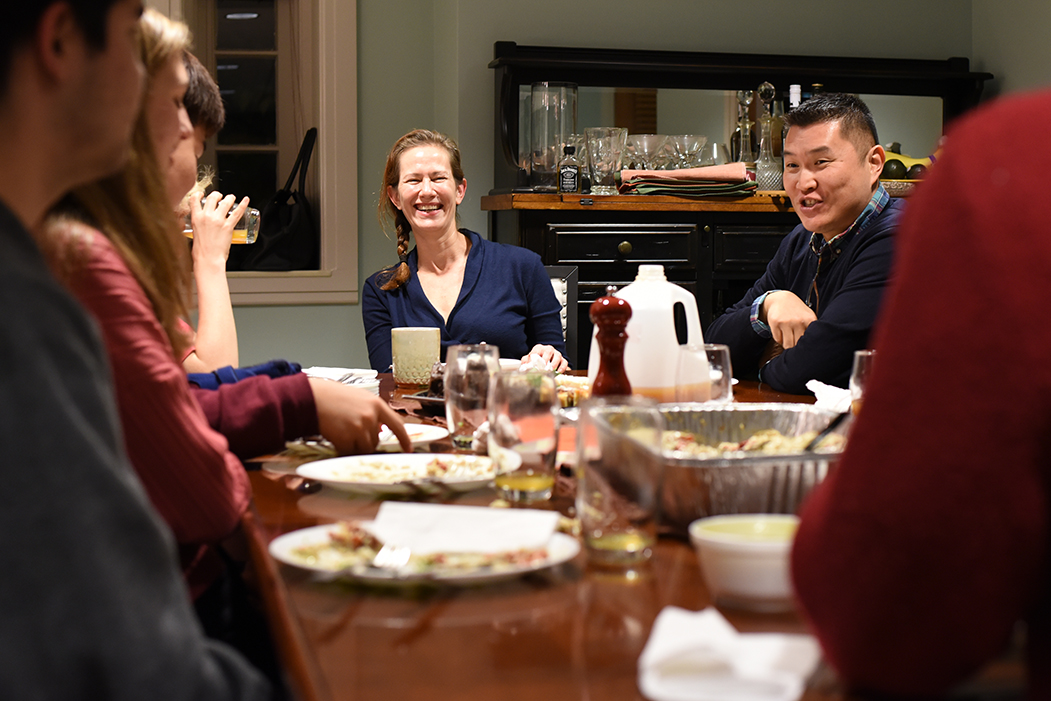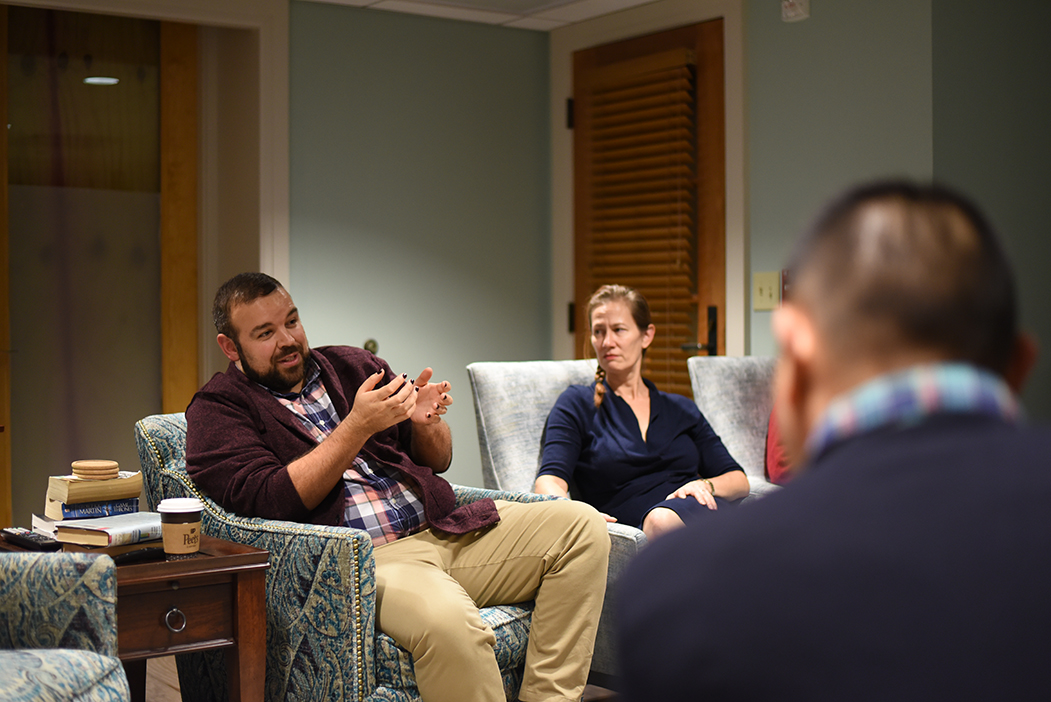East House Closes LGBTQI History Month with Dinner Focused on LGBTQI Scholarship, Advocacy
Once or twice a month, the faculty residence at East House—one of ten houses where first-year students live on the Ingram Commons—is filled with the smell of a delicious catered dinner. Faculty Head of House Elizabeth Meadows cautiously opens her front door: her dog Luna loves to dash out and greet the visitors arriving for East Feast. These intimate dinners give East House students a chance to meet informally with faculty and staff and engage in thought-provoking conversations about finding their way at Vanderbilt and beyond.
The most recent dinner, held on October 29, focused on issues connected with LGBTQI History Month. The highlighted guests were Kitt Carpenter, E. Bronson Ingram Chair and Professor of Economics and director of the Vanderbilt LGBT Policy Lab, and Chris Purcell, director of the Office of LGBTQI Life. Over a relaxed dinner from The Cookery, the two swapped hometown anecdotes with students, fielded questions about current Supreme Court cases, and shared their own stories of academic and professional discovery.
“I like to tell students that their first year at Vanderbilt is a good time to declare their mission, rather than their major, to borrow a phrase from Aaron Dworkin [former Dean of the University of Michigan School of Music, Theatre, and Dance]. So the East Feast visitors tell the students how their scholarship and other work feeds into their own mission, and how they discovered that mission in the first place,” said Meadows, who is also a senior lecturer in the English department and associate director of the Robert Penn Warren Center for the Humanities.

Carpenter, who researches economic policy as it affects LGBTQI individuals, always knew he wanted to specialize in that field. While earning his Ph.D. at UC-Berkley, however, he said he got “lots of advice to do something ‘more mainstream’ to make getting tenure easier.” But for Carpenter, who is gay, the work was more than just an academic interest. He believed it was important for more LGBTQI scholars to engage with the field, and he wasn’t willing to compromise his focus.
“Academics struggle with the way our personalities and personal experiences color what we do,” he said. “There’s a fine line between research and advocacy, and once you’re seen as an advocate rather than a researcher, it’s harder to get funding and respect.”
Despite what his critics told him, at Vanderbilt he found a coterie of like-minded scholars housed within a university willing to provide significant funding and institutional support. The LGBT Policy Lab receives backing from Vanderbilt’s Trans-Institutional Programs initiative to study how issues such as wage disparities, workplace discrimination, and tax policy affect the LGBTQI community.

Like Carpenter, Chris Purcell found his calling in graduate school. While studying for his M.Ed. at the University of Vermont, he served as a graduate assistant for LGBTQA services and later worked as program coordinator for Duke University’s Center for LGBT Life. A stint at Berklee College of Music, where he ran the peer adviser program for first-year students, only confirmed his direction. He kept drifting into informal work with the LGBTQI community and realized he missed that part of his job. When the opportunity arose to lead Vanderbilt’s Office of LGBTQI Life, taking the job was a no-brainer.
Purcell has taken advantage of the office’s location in a historic dean’s residence to make the space as home-like as possible. The building doubles as a student center and includes a living room for socializing and relaxing, smaller quiet areas for studying, and even a kitchen where students can cook and eat together. The goal is for all students to feel safe, comfortable, and welcomed.
In addition to overseeing LGBTQI-related student programming, Purcell supports LGBTQI inclusiveness in other departments across the university. He has helped lead a number of initiatives, including the construction of gender-neutral bathrooms and student housing and the expansion of employee insurance benefits to cover medical gender transition.
Overall, both Carpenter and Purcell wanted the students to know that social impact research or advocacy can be challenging, but making a difference is worth the effort.
“There’s been a lot of really major, really rapid change around sexuality, gender identity, race—all kinds of social issues,” Purcell said. “It’s been really hard work but really rewarding work.”
